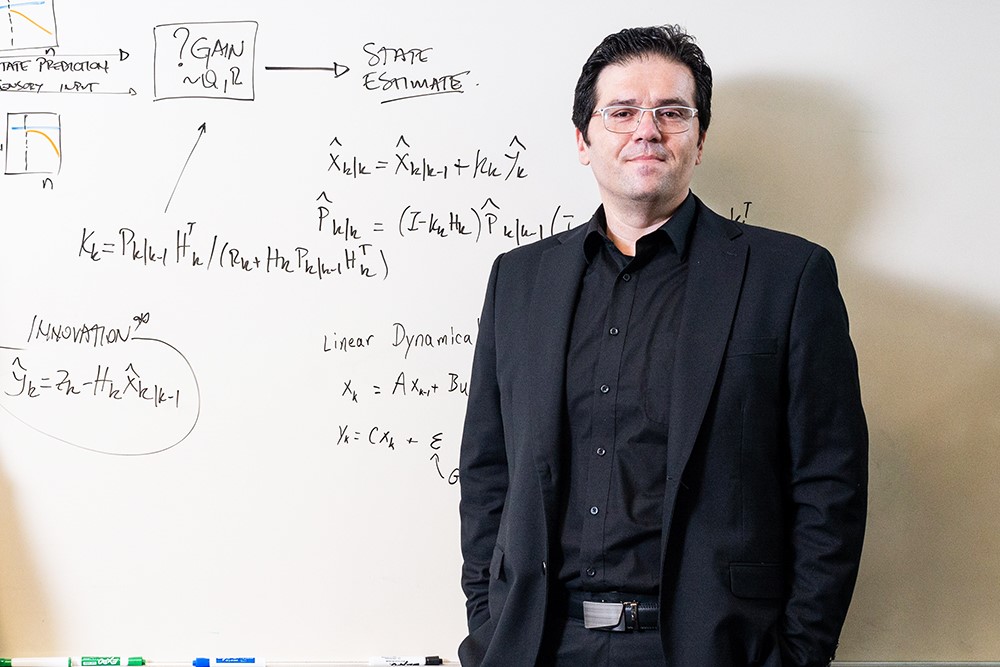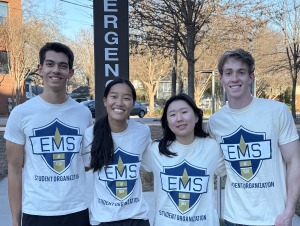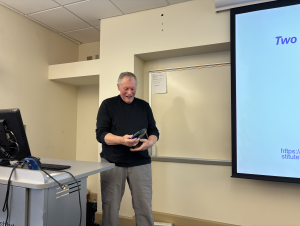Congratulations on your admission to Psychology at Georgia Tech!
We're very happy to welcome you to the School of Psychology as part our newest class of admitted students! This page is meant to serve as a resource for you as you approach your final decision on where to continue your education. The School of Psychology at Georgia Tech presents unique opportunities, with a strong emphasis on scientific practice, five active areas of research, over a dozen research labs, a flexible degree program, and faculty committed to delivering the highest quality education. A Bachelor's in Psychology at Georgia Tech is a pathway to many different career and post-graduate opportunities, and we hope you'll join us on campus at the start of the next academic year.
Undergraduate Spotlight
Fall 2024 Alumni Feature
 Emily Hokett, Ph.D.
Emily Hokett, Ph.D.
Postodctoral Research Scientist, Colimbia University, Manbrick Lab, New York
Emily was accepted into the School of Psychology Ph.D. program – Cognition and Brain Science by former Faculty Advisor, Dr. Audrey Duarte. She later graduated from the program in 2021.
"My PhD program was challenging, but also rewarding. I learned about aging, cognition, electroencephalography, and neuroimaging from many experts in the field. I am grateful for the collaborations, mentorships, and friendships that developed along the way."
Frequently Asked Questions
1. Can I double-major with psychology and a different major? How do double-majors work?
Yes, you can double-major with psychology and a different major. Georgia Tech allows students to pursue two separate Bachelor's degrees simultaneously while counting some credits toward both degrees. Your secondary degree (your non-Psychology degree) must have 36 unique hours of credit which are not counted toward your primary degree (your Psychology degree). However, you can complete credits for both degrees simultaneously and finish them in the same semester.
In practice, this will raise the number of credits needed to finish your time at Georgia Tech from 122 to 158 total. All other requirements for both degrees must be satisfied as well, and some degrees may have rules against double-counting certain courses between degrees. If you'd like to double-major, you will want to make sure you're familiar with the requirements for both degrees, and check in frequently with your advisors to make sure you are progressing properly.
One notable exception to this is Computer Science, which has unique rules for double-majoring. You can find guidelines for double-majoring in Computer Science on the College of Computing's website.
2. What's the difference between psychology and neuroscience as a major?
While psychology and neuroscience do have some overlap, they are distinct majors. Simply put, neuroscience will provide a deeper exploration of biology, while psychology will provide a deeper exploration of behavior. The psychology degree at Georgia Tech encompasses many different fields, examining the intersection of the brain and behavior as well as people and technology. This allows students flexibility of focus, as a student may choose to take electives which gear their degree toward a number of different sub-fields (such as engineering psychology, industrial/organizational psychology, quantitative psychology, cognition, and more).
From a practical standpoint, psychology majors may have slightly more flexibility in building their degree, as the Bachelor's in Psychology allows students 32 hours of "Free Elective" credits, while the Bachelor's in Neuroscience allows only 14 hours of "Free Electives" credits (both programs require 122 total hours of credit for completion). Both programs are excellent options, and the right choice for you depends on your individual goals and focus. If you have further questions, please don't hesitate to reach out to our advisors.
3. Can I pursue a pre-med path as a psychology major? If so, what do you recommend?
Absolutely! Historically, the Bachelor's in Psychology at Georgia Tech has been a great option for students looking to move on to medical school following graduation. The scientific foundation, emphasis on brain and behavior, and flexibility of the psychology degree make it an ideal choice for aspiring medical students, physician's assistants, physical therapists, and more!
There are many paths you can take as a pre-med student, but the most common for our students is pairing the Psychology Major with a Minor in Health and Medical Sciences (HMED). The combination of these programs will allow you to complete most, if not all, of the requirements for medical school. The HMED minor would count as 15 hours toward the required 32 hours of Free Electives a psychology major must complete. Any remaining requirements can be completed as Free Electives.
Students looking to pursue medical school are encouraged to reach out to their academic advisor and Georgia Tech's dedicated Pre-Health Advisors.
4. Can I pursue a pre-law path as a psychology major? If so, what do you recommend?
As with pre-med, psychology is a great undergraduate degree for anyone interested in pursuing law school. The program's emphasis on systematic thought, written communication, and verbal presentation as foundational skills make it a great fit as a pre-law major.
Students interested in pursuing law school are encouraged to pair the Psychology Major with a Minor in Law, Science, and Technology. This minor would account for 15 of your 32 required Free Electives hours as a psychology major. Additionally, Georgia Tech offers support for pre-law students, including online resources and dedicated advising.
5. Will I have the chance to get involved in research at Georgia Tech as a psychology major? What's the best way to do so?
Research training is a major part of the Bachelor's in Psychology at Georgia Tech. As part of your required courses, you will complete a team-based research project (in PSYC 2015 - Research Methods) and have the opportunity to go even more in-depth on a research project for your capstone experience. Outside of the classroom, we have five research programs (Adult Development and Aging, Cognition and Brain Science, Engineering Psychology, Industrial/Organizational Psychology, and Quantitative Psychology) with many active research laboratories which are always looking for new research assistants. Historically, about 80-90% of our graduates in any given semester have experience as a research assistant at some point in their academic careers.
If you want to get involved in research, we recommend reviewing Undergraduate Research Opportunity's (UROP) 7 Steps to Get Involved in Research. Once you're ready to enroll, you can review the specific procedures for enrolling in research hours as a psychology major. Please note that you can get involved in research even as a freshman or sophomore! Don't feel like you need to wait until your junior year to begin.
6. What minors do psychology majors usually pursue? How easy is it to minor?
Psychology is one of the easiest majors to pair with a minor, due to our number of Free Elective credits (32 hours). Psychology majors are free to pair their degree with whatever minor they would like, and even have an opportunity to declare two minors (each minor is 15 hours of course work). Common minors include Health and Medical Sciences (HMED); Biology; Law, Science, and Technology; Spanish; and the Science of Mental Health and Well-Being.
Minors have recently been approved in Computation and Cognition and Neuroscience as well, and we anticipate these minors being attractive options for current and future psychology majors as they continue to grow.
7. What exactly can I do with a degree in psychology?
The psychology degree at Georgia Tech prepares you for many different career paths. Generally, career options are considered depending on whether a student decides to pursue graduate studies or not.
Students who want to leave school with a Bachelor's in Psychology will find employment opportunities in human resources, business, data science, advertising, and many other fields. The American Psychological Association's website gives an overview of the many paths open to psychology majors who end their education with a bachelor's.
Those who choose to pursue further education have even more opportunities. Those who continue their education in psychology specifically can look forward to opportunities as counseling and clinical psychologists, school psychologists, health psychologists, and many other applied fields. Those with a Ph.D. may choose to stay in academia as researchers and instructors, or apply their talents in industry fields as consultants and other professionals.
Medicine and law are also popular options for psychology majors following their undergraduate education. Georgia Tech offers specific degree additions to help students on these paths. For more information, see the questions related specifically to medicine and law above.
Regardless of which path you choose, Georgia Tech has programs to support your goals. Our minors, certificates, and degree additions are designed to help you narrow your focus and build a profile that will make you an attractive candidate in your target field.
8. Are there study abroad opportunities associated with psychology at Georgia Tech?
Yes! Study abroad programs with psychology offerings include our Scotland Summer Program, the Barcelona Fall Study Abroad Program, and the Oxford Summer Program. Psychology majors are also free to pursue other study abroad opportunities to fulfill general education, free elective, or minor requirements. Many of our students take advantage of Georgia Tech's study abroad options at some point during their degree. Those with a particular interest in working abroad after school may also be interested in the International Plan, a diploma designation marking extensive study abroad experience and proficiency in a second language. Similarly, the Global Engagement Certificate indicates international experience without the stringent study abroad and language proficiency requirements of the full International Plan.
9. What should I consider before making my decision about where to attend college?
We understand this is a very serious and difficult decision for you to make. Considerations of location, cost, and overall "fit" are important and personalized to every admitted student. More generally, we suggest psychology majors consider the availability of research opportunities, as these opportunities are essential for building a strong resume or CV for graduate opportunities, opportunities for growth beyond the required courses, which will allow you to focus your studies and build a profile for potential employers or graduate schools, and perceived value of the degree by future evaluators. We believe Georgia Tech excels in each of these areas, and these strengths set our psychology program apart from peer institutions.











